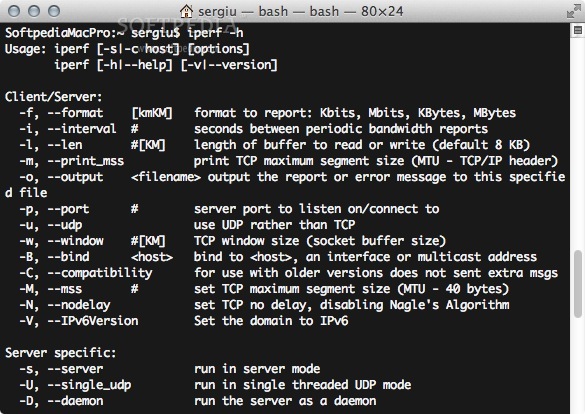

- #Command to install iperf2 mac full#
- #Command to install iperf2 mac Pc#
- #Command to install iperf2 mac mac#
#Command to install iperf2 mac mac#
Now designate the second Mac a client by using this command in Terminal: iperf3 -c This Mac is now listening for an incoming client with which to test.

When prompted by OS X, allow Iperf to accept incoming network connections. Head to your first Mac and designate it as a server by entering the following command in Terminal. You can either move between them physically (much easier if at least one of them is a laptop that you can bring with you to the other Mac) or access one of the Macs remotely via Secure Shell (SSH) or OS X Screen Sharing. Also, you'll need to move back and forth between your two Macs. Note: for these steps you’ll need Homebrew and Iperf installed, detailed in Part 1. Go to (or otherwise obtain) a second Mac and repeat the steps above to install Homebrew and Iperf. You’ve just installed Iperf on one Mac, but you’ll need a second Mac to test your network. If you’re interested in learning more, check out the project’s FAQ and Tips N’ Tricks pages. This, of course, is just a small example of what Homebrew can do. The latest version of Iperf3 will be downloaded and installed automatically. Once Homebrew installation is complete, all you need to do to get Iperf is use the following command: brew install iperf3 Just follow the instructions as they’re presented. The Homebrew install script will go step-by-step, explaining what it’s doing and prompting you to continue. If you don’t already have Homebrew, open Terminal and run the following command: ruby -e "$(curl -fsSL )" Iperf natively runs as a command line utility in Terminal, and the best way to get it is via Homebrew, the open source packet management system. Iperf then sends data directly between the two computers, revealing the maximum speed of the wired or wireless network connecting them.

#Command to install iperf2 mac Pc#
For most users, this means using a PC or Mac on your home network as a server, and then testing the bandwidth between that server and another device also on your home network.Ī great utility to test bandwidth between two devices is Iperf, a free tool that you install on at least two computers, designating one of them as the server and the second as the client.
#Command to install iperf2 mac full#
If you’re interested in determining the full speed of your home network and, by extension, your router, you’ll need a server that can transmit and receive data faster than your Internet connection. Online speed tests like work well for testing your Internet connection's speed, but very few users have an Internet connection that can max out an internal home wired or wireless network. When you’re connected to the Internet, this kind of transmission occurs constantly as your Mac, iPad, or iPhone communicates with the Web servers that host your favorite websites.

In order to measure the performance of a network, you need at least two devices: one to send data and the other to receive it.


 0 kommentar(er)
0 kommentar(er)
